|
|
|
Sort Order |
|
|
|
Items / Page
|
|
|
|
|
|
|
| Srl | Item |
| 1 |
ID:
151213
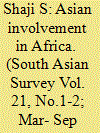

|
|
|
| 2 |
ID:
151208
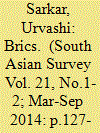

|
|
|
|
|
| Summary/Abstract |
Brazil, Russia, India, China and South Africa (BRICS) have received considerable analysis as a group attempting to present an alternative to West-driven institutions and hegemony. While its formation is a positive development for the South, it requires to reach out to civil society. BRICS, minus a robust civil society involvement, will only result in entrenching viewpoints that see the BRICS as representing narrow business interests of a southern elite, with little concern for the gamut of socio-economic problems confronting the people of Southern nations.
|
|
|
|
|
|
|
|
|
|
|
|
|
|
|
|
| 3 |
ID:
151221
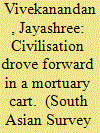

|
|
|
|
|
| Summary/Abstract |
Violence presents us with an interesting motif to study colonial politics, aptly captured in James Milne’s telling metaphor. Its inextricable association with colonialism implied a gradual conflation of political order with civilisation that is discernible in extant writings. The conventional paradigm in International Relations (IR) regards order as coterminous with the domestic domain and anarchy to be the structural attribute of international politics. This dichotomous divide permits little space for the hybrid states of existence of both anarchy and order that were often witnessed in the colonies and written about. The article examines the manner in which colonialism applied the notion of violence to the Indian context that was in denial of such complexities. It further argues that bringing imperial relations within the ambit of IR would help explain the differentiated interpretations of sovereignty that marked the parallel existence of the sovereign state system and the imperial political system.
|
|
|
|
|
|
|
|
|
|
|
|
|
|
|
|
| 4 |
ID:
151220
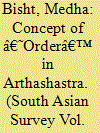

|
|
|
|
|
| Summary/Abstract |
Going beyond the binaries of Western and non-Western, this article lays out a conceptual–analytical frame for understanding ‘order’ in international relations (IR). What does ‘order’ mean? What are its key characteristics? How is the conventional ‘Western’ understanding different from or similar to the understanding advanced in Arthashastra ? These are some questions that this article seeks to address. The article picks up the discussion on English School of IR, juxtaposing it with Kautilya’s Arthashastra . The indicators chosen for this more revisionist interpretation of the text are ‘operative principles’, ‘code of conduct’ and ‘structures’. It is argued that the Kautilyan concept of order is broadly normative whereby norms were stipulated by the dharmashastras . Thus, underlining the distinct cultural and contextual undertones, the article emphasises that the normative underpinnings of ‘order’ in Arthashastra have to be read within the existing philosophical frames of the Hindu tradition. The cognitive–cultural frame of understanding orders perhaps best suits the purpose.
|
|
|
|
|
|
|
|
|
|
|
|
|
|
|
|
| 5 |
ID:
151202
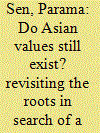

|
|
|
|
|
| Summary/Abstract |
In a world ripped with conflicting issues stemming from varying interests and pressing common concerns, the role of culture and tradition seems to have gained greater salience. At the core of Asia’s cultural assertiveness lies the concept on Asian values. Claimed to be rooted in Confucianism, the discourse appeals to the communitarian Asian tradition pitting it against the individualism of the West. While the use of the concept to explain the economic prosperity of East and Southeast Asia and as a counterforce to globalisation was thwarted by the Asian financial crisis, the belief that Asia and Asians subscribed to a value system fundamentally different from that of the West lingered on. This article seeks to analyse the contemporary relevance of the concept of Asian values and delve into its roots in an attempt to attune it to current realities.
|
|
|
|
|
|
|
|
|
|
|
|
|
|
|
|
| 6 |
ID:
151218
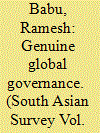

|
|
|
|
|
| Summary/Abstract |
Revolutionary changes sweeping the world since the mid-1980s have transformed international and global politics. Major issues and challenges confronting mankind have become global and demand global solutions. However, present international institutions are out of tune with today’s realities. Reforms will not do. New forms of global governance are needed. This is an opportune time for the Global South (Third World) to rise to the occasion and offer viable alternative conceptions of global governance that are more cooperative, inclusive, equitable and legitimate. Towards this end, mankind has to draw from all the living civilisations on earth and formulate a ‘confluence of cultures’ as the conceptual foundation for ‘genuine global governance’. Mankind needs a new ‘philosophy of globalism’. In this context, Hindu civilisation’s ideas on the rights and duties of man; man’s relationship with his family, community and society; his place on earth; and its emphasis on living in tune with nature deserve attention.
|
|
|
|
|
|
|
|
|
|
|
|
|
|
|
|
| 7 |
ID:
151207
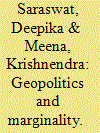

|
|
|
|
|
| Summary/Abstract |
Theorisation in modern geopolitics is replete with instances where certain regions have been accorded a marginal status in various schemes of global political–geographical configurations. Geopolitical ideas propounded by Halford J. Mackinder, Nicholas Spykman and Saul B. Cohen are all evidence of geopolitical visualisation and ordering which advantage certain parts of the world by geo-graphing them as strategically important. This ordering disadvantages certain other areas as less important and, therefore, marginal in the context of international politics. The study here attempts to locate the ascription of marginality in modern geopolitics.
|
|
|
|
|
|
|
|
|
|
|
|
|
|
|
|
| 8 |
ID:
151200
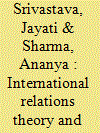

|
|
|
|
|
| Summary/Abstract |
Mainstream international relations theory is consumed by its proclivity towards order; the genesis of which has been attributed to its statist ontology. Such theorisations, by drawing binaries between order and disorder, either assume or normalise order or obfuscate and suggest ways of mitigating any kind of disorder. Paradoxically, questions about the foundational edifice of order are marked by silences. Within the context of world order, this obtains a theoretical framework that precludes any normative reflection on the making and unmaking of world order or the principles that sustain that order. The article looks at how different branches of international relations theory envisage world order and the silences embedded therein. Further, by locating order and disorder inhabiting the same reality along a continuum, alternative readings of world orders are drawn from the critical theoretical traditions in which various articulations of justice impart normative pillars to the world order.
|
|
|
|
|
|
|
|
|
|
|
|
|
|
|
|
| 9 |
ID:
151210
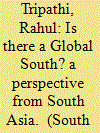

|
|
|
|
|
| Summary/Abstract |
Much of the writings on the Global South in recent years have focused on the role that some of the emerging economies within the developing world might play in the unfolding global scenario. It is asserted that the rise of a group of middle-level players, given their economic and political profile in global affairs, may be critical in shaping future global outcomes. Such an influence may come at a time when the power of the established powers is seen in relative decline, particularly given the volatility of the global political economy in recent years. The article tries to revisit this assumption from a South Asian perspective and tries to explore the fundamentals of the Global South in terms of its ability to provide alternatives. Taking South Asia as a test case, the article argues that the term ‘South’ itself as a homogeneous entity is problematic from the point of view of characterisation as well as actualisation of the potential alternatives. While this does not rule out coalition building and collective action between countries sharing common interests and objectives, such coalition building may be more diffused and episodic rather than have the potential to provide ‘alternative orders’.
|
|
|
|
|
|
|
|
|
|
|
|
|
|
|
|
| 10 |
ID:
151201
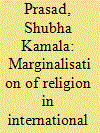

|
|
|
|
|
| Summary/Abstract |
This article aims to address why religion has been marginalised in international relations (IR) and discusses its implications. The first section examines the literature on the secular roots of the discipline of IR and how theoretical inputs from the West are shaped by context-specific European events and philosophies that are not ‘universal’ in nature. The second part delves into how the existing theoretical traditions of IR—realism, liberalism and constructivism—can incorporate religion as a variable in evaluating international politics. The final section will explore the problems with the recent spate of literature from the West after 9/11 on religion and IR. The article contends that the Indian conception of secularism, which has been studied in-depth vis-à -vis Indian domestic politics but not international politics, can be further examined to formulate frameworks that understand and deal with religion in IR.
|
|
|
|
|
|
|
|
|
|
|
|
|
|
|
|
| 11 |
ID:
151205
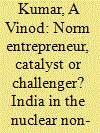

|
|
|
|
|
| Summary/Abstract |
The history of India’s interaction with the normative structures of the non-proliferation regime has been unique albeit tumultuous. The vibrancy of the roles and identities that India had attained in the normative churning of the regime is a useful case study to understand the dynamics of norm construction within the non-proliferation system. While the model of norm entrepreneurship can be used to explain this phenomenon, the Indian example shows that the spectrum of the term ‘agency’ can transcend the existing understanding of norm entrepreneurship. The article uses India’s non-proliferation history to examine how actors, based on their conceptions of interest and driven by various systemic factors, influence the norm construction process through different role identities.
|
|
|
|
|
|
|
|
|
|
|
|
|
|
|
|
| 12 |
ID:
151204


|
|
|
|
|
| Summary/Abstract |
Why does the quest for security lead to insecurity? In its quest for becoming secure, mainstream international relations (IR) has weaved a fictitious web that hardly lives up to its promise of providing security to the international community. It is through the vocabulary of securitisation that the freedom to resist and express dissent is nipped in the bud. Security is premised on a flawed assumption. The insistence on the usefulness of assumptions instead of their truthfulness is not just misleading but a theoretical sleight of hand. Security seems to have flourished owing to a unidimensional view of human nature and a unilinear extrapolation of anarchy, which is considered as the central facet of international political structure. This article contests these assumptions and argues that the construction of security is tantamount to a façade that gives a false impression of security, thereby concealing and camouflaging the hegemonic nature of such an endeavour.
|
|
|
|
|
|
|
|
|
|
|
|
|
|
|
|
| 13 |
ID:
151222


|
|
|
|
|
| Summary/Abstract |
Making an inventory of postcolonial scholarship on India reveals both its criticality and its limits. While the body of postcolonial work has been remarkable for pointing out the oppression under the British, it has been stubbornly silent about the Indian princes. This article does four things: First, it points out the uneven development of scholarship on the Indian princes and attempts to demonstrate why the Indian princes, their history and politics remain unappealing to postcolonial theorists. Second, it posits that the continued neglect of the Indian princes is part of a larger malaise of modern India. The remaining part of the article prises upon the Indian princes to look at how their subjectivity and gaze have been overlooked to produce a certain kind of narrative about them, which is coarse and unable to accommodate their complexity. It finally reverses the gaze by looking at the kingdoms from inside out. By looking into the works written by insiders, it offers a previously unheard voice.
|
|
|
|
|
|
|
|
|
|
|
|
|
|
|
|
| 14 |
ID:
151219


|
|
|
|
|
| Summary/Abstract |
The admission by the International Monetary Fund (IMF) that it did not accurately estimate the damage that austerity will do to the Greek economy is yet another failure of the world body. It has admitted making similar mistakes in the past in handling economic crises in Mexico, Russia and Argentina. What was the exact nature of the Greek financial crisis? And how did the IMF handle this crisis? What were the Fund’s follies in its handling of the Greek crisis? Is there a pattern in the follies of the Fund in handling economic crises? If yes, then what does it tell us about the IMF and its governance of the world economy? This article seeks to answer these questions in the wake of long-pending reforms of the Fund’s governing structure and voting rights. Obviously, there is a need for more than just ‘fine-tuning’ of the Fund’s lending policies. Reforms such as expansion of the governing committee and increasing the quota share of developing countries are crucial for ‘re-imagining’ a stronger and more effective IMF that is more in tune with the changing global order of the twenty-first century. This article will take stock of the IMF quota and governance reforms initiated by the Fund in 2010 and review some other reform proposals that reflect the significant shifts in global economic power in the twenty-first century.
|
|
|
|
|
|
|
|
|
|
|
|
|
|
|
|
| 15 |
ID:
151216
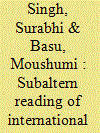

|
|
|
|
|
| Summary/Abstract |
The article draws on Bourdieu’s notion of orthodoxy and doxa , whereby a particular view of the world becomes established as a normal, natural and unquestioned truth, as the entry point for the discussion on international organisations and issues of order, disorder and marginality. Every established order, according to Bourdieu, tends to produce very different degrees and with very different means, the naturalisation of its own arbitrariness, whereby it successfully manages to make the world conform to the myth of it being a self-evident and natural order. Such a project as the article argues, given the very constitution of international society is highly problematic, especially from the standpoint of those traditionally located at the very margins of decision making—the subalterns. In deconstructing the meaning and substance of ‘order’ through select case studies, the article seeks to explicitly focus on international organisations as sites of power and control, the processes of institutionalisation and socialisation and the possibilities of change that posit new ways of thinking about issues of order and disorder in international relations.
|
|
|
|
|
|
|
|
|
|
|
|
|
|
|
|
| 16 |
ID:
151203
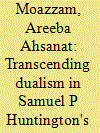

|
|
|
|
|
| Summary/Abstract |
Glorification of ‘self’ (Western civilisation) at the expense of the ‘other’ (eight civilisations) was inherent in Huntington’s Clash of Civilizations thesis. The ‘other’ civilisations identified—as the non-self and situated mostly in the Global South—were clubbed together as the Rest, irrespective of their pluralism. Building on Huntington’s binaries—the West and the Rest—this article makes an attempt to reflect on similarities within the perceived differences. Even though his civilisations appear different, they are in many ways similar due to interactions, colonisation and globalisation. Their relationship has become complicated; Western civilisation cannot do without civilisations from the Global South. Hence, there can be no perpetual or fixed enemy nor can all relationships be suspended with the ‘other’ in a globalising world.
|
|
|
|
|
|
|
|
|
|
|
|
|
|
|
|
| 17 |
ID:
151223
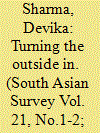

|
|
|
|
|
| Summary/Abstract |
Challenging the inside–outside dichotomy in international relations (IR) allows us to recognise and give voice to histories, positions, reflections, processes and actors that were invisible, marginalised or considered beyond the purview of the discipline. ‘Turning the outside in’ is not only about disrupting the long-held disciplinary boundaries but also about bringing into the mainstream that which had been overlooked or seen as epiphenomenal because of the centrality of the inside–outside dichotomy. Given the vantage point that ‘outside’ histories, ideas and worldviews provide, India and other postcolonial countries are well ‘placed’ to take advantage of looking ‘in’ and hence blurring the boundaries between inside and outside. However, it is important to underline the fact that, although multiple voices and perspectives need to be heard, they must do so free of the very frames and dichotomised approaches that signified knowledge building and dissemination for the better part of IR’s evolution as a discipline.
|
|
|
|
|
|
|
|
|
|
|
|
|
|
|
|
| 18 |
ID:
151199


|
|
|
|
|
| Summary/Abstract |
Conventional international relations (IR) builds on Western problems and remain fixated on the Western understanding of war and conflict. Such ontology is grossly misleading to reflect upon and make sense of conflicts of the non-Western world. Western theories are based on ontological imaginations that are removed from the historical and sociological experiences of the non-Western world. Understanding non-Western conflicts requires an ontology based on the experiential reality of the post-colonial other. However, unless local variants are sufficiently factored in, it may also become as hegemonic as the Western imagination/s that it wishes to resist, counter and transcend. Conflicts in post-colonial societies demand explanatory frames sensitive to their historical and sociological specificities. The challenge before academic IR remains to question its Eurocentric ontology and historicise the subjectivity of the non-Western world. Epistemology is not the site for this much-needed breakthrough. Understanding the non-West is prior to understanding its conflicts.
|
|
|
|
|
|
|
|
|
|
|
|
|
|
|
|
|
|
|
|
|